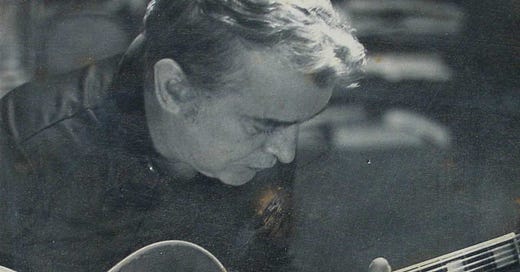Joe Monk hugged his guitar when he played.
Perhaps it was an emotional appeal to the visual senses. One of his many students says that when Monk played, it looked as though the talent did not come easily. But Monk played like an angel, and it was easy to him.
It’s just that the talent gave him grief.
Maybe.
No one knows for sure because there isn’t much to know about Joe Monk, aside from an ever-dwindling reserve of surviving students, all of them with one or more variations on the same story about him.
There’s also a live recording, the only one of its kind, the only time the mic-frightened Monk was ever captured for posterity. That tape and those stories are all we have.
My brother was that student mentioned above. My father was another.
My brother is alive. My father is not.
The discovery of the genius guitarist begins with the hunt for an accordion teacher.
The lessons were for another one of my siblings.
The hunt led my father to a studio in Little Neck, NY. He went to the studio and found the accordion teacher.
Some splendid jazz guitar was coming from somewhere down the hallway.
My father thought it sounded like Joe Pass. He wasn’t alone. Many thought Monk’s playing resembled Joe Pass.
My father took a walk down the hallway and found Monk in his studio.
He looked like a longshoreman or a truck-driver—beefy face, sunken eyes. He could have been a Paddy Chayefsky protagonist.
My father began taking lessons.
Monk gave him some arrangements. He wrote them off the top of his head—as my father put it, “Like he was writing a letter.” Jazz standards for solo guitar.
Then Monk ran through one of his arrangements.
“You make it look so easy,” said my father.
Monk’s rejoinder was one he gave many times. Like a solo, there were stop phrases and resolutions, variations on a theme, but the familiar song underneath was always there. “When did you ever sit in a room for eight hours and practice? When I was a kid, my friends thought I was weird. They’d say, ‘C’mon, Monk, c’mon out and play ball.’ And I’d say, ‘I can’t. I’m practicing my guitar.’
“And they’d say, ‘That Monk is weird, man.’”
Monk was a blue collar guitarist, unwilling to admit he had a gift.
Instead, he seemed to prefer the story of a man who’d sacrificed a third of his life for his work, and that that was the only way he could have gotten there.
My father went to see his teacher perform live. After the gig, Monk sat down for a drink.
(Monk always sat down for a drink.)
During a lull in the conversation, my father began to scat along to the music on the jukebox.
“You can do that?” said Monk. “Why can’t you do that on the guitar?”
My father was flummoxed.
“You’re afraid of making mistakes, aren’t you?” said Monk.
Monk had some advice for my father: Ignore technicality for solos, forget mistakes. Just play the notes in your head, the same ones you sing when you scat along to music.
Monk made it sound easy too.
As for the drink, well, the drink was a friend to Joe Monk.
My father remembered showing up for lessons at Monk’s relocated studio—a room above Clancy’s Bar in Little Neck—only to arrive to a hastily scrawled sign on the door:
Mr. Monk is sick
Perhaps alcohol was meant to remedy whatever disease Joe Monk had that would not allow him to admit he was a genius.
His lessons were technical.
His playing was technical too. It was all about the fingering.
How then does technicality come into play in the following scene: Joe Monk sits, hunched over, hugging his guitar. He begins a run up the neck. But the first two or three notes are barely audible. As far as the people in the back of the club are concerned, they aren’t audible at all. The run continues, a galloping mix of arpeggios and grace notes, growing louder as the line comes to its resolution. Technical, sure—it’s all in the fingering, in the touch.
So is sculpture.
Only one recording of Joe Monk survives.
My father once asked Monk why he never recorded any of his playing.
“No,” said Monk. “No recording.”
That was his answer.
One night in 1962, a man by the name of Ray Gogarty snuck a tape recorder into Club 40 on Long Island and recorded the gig. The recording captures something that never was.
God bless Ray Gogarty.
Joe Monk preferred teaching to playing gigs.
He eventually quit playing clubs altogether.
(That Monk is weird, man. All he wants to do is play his guitar.)
Hear for yourself, the sound of a ghost of a life.





